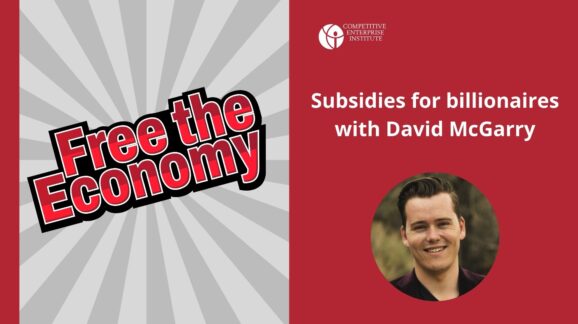There are two main areas in which Congress can enact meaningful reform. The first is to rein in regulatory guidance documents, which we refer to as “regulatory dark matter,” whereby agencies regulate through Federal Register notices, guidance documents, and other means outside standard rulemaking procedure. The second is to enact a series of reforms to increase agency transparency and accountability of all regulation and guidance. These include annual regulatory report cards for rulemaking agencies and regulatory cost estimates from the Office of Management and Budget for more than just a small subset of rules.
In 2019, President Trump signed two executive orders aimed at stopping the practice of agencies using guidance documents to effectively implement policy without going through the legally required notice and comment process.
Featured Posts

Blog
Free the Economy podcast: Subsidies for billionaires with David McGarry
In this week’s episode we cover White House intervention in corporate ownership, the nation’s falling economic freedom ranking, and welcome new…

News Release
Federal appeals court rules on NLRB unconstitutionality
The 5th Circuit Court of Appeals today issued a ruling suggesting the structure of the federal government’s top labor dispute regulator, the National Labor Relations…

Blog
The week in regulations: Import paperwork and postal possession
The 2025 Federal Register topped 40,000 pages. President Trump met with Vladimir Putin in Alaska. The Producer Price index rose at its fastest level since…
Search Posts
Blog
The Coronavirus Outbreak Highlights Importance of the Artificial Intelligence Debate
Tracing of individuals and other measures involving artificial intelligence are in the news with respect to managing individuals’ reentry into the economy in the wake…
Blog
This Week in Ridiculous Regulations
New unemployment applications were down to 4.4 million last week. This is still more than an order of magnitude greater than the pre-coronavirus record. With…
Blog
DEREGULATION IN AN EMERGENCY: The President’s Emergency Powers Include Not Just Imposing Regulations on Industry, but also Suspending Regulations
Across the country, governors have suspended harmful regulations on an emergency basis due to the COVID-19 crisis. The improvements that have resulted have got people…
Blog
Congress Has Already Introduced Bills to Reform #NeverNeeded Regulations
Policy makers have already waived more than 350 regulations and counting that were slowing the pandemic response and harming economic recovery. But with a 185,000-page…
Reason
Federal Regulations Are Making the Grocery Store Supply Crunch Worse
Reason cites Senior Fellow Gregory Conko on FDA food regulations: “It’s not terribly unreasonable to have these sort of minimal safety rules remain…
Washington Examiner
COVID-19 is Changing Politics in Ways Good and Bad
The Washington Examiner cites CEI’s #NeverNeeded campaign: At the same time, a great many petty regulations are being scrapped. Rules on plastic bags,…
Staff & Scholars

Clyde Wayne Crews
Fred L. Smith Fellow in Regulatory Studies
- Business and Government
- Consumer Freedom
- Deregulation

Ryan Young
Senior Economist
- Antitrust
- Business and Government
- Regulatory Reform

Fred L. Smith, Jr.
Founder; Chairman Emeritus
- Automobiles and Roads
- Aviation
- Business and Government

Sam Kazman
Counsel Emeritus
- Antitrust
- Automobiles and Roads
- Banking and Finance

Marlo Lewis, Jr.
Senior Fellow
- Climate
- Energy
- Energy and Environment